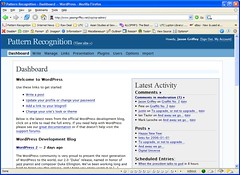The first foray of this new web startup into the media seems….confused. Here’s a few snippets from the ZD Net article:
A new online information service launching in early 2006 aims to build on the model of free online encyclopedia Wikipedia by inviting acknowledged experts in a range of subjects to review material contributed by the general public.
Called Digital Universe, the project is the brainchild of, among others, USWeb founder Joe Firmage and Larry Sanger, one of Wikipedia’s earliest creators.
Ok…so far, so good. Misguided, I think but…doable.
By providing a service they’re calling “the PBS of the Web,” the Digital Universe team hopes to create a new era of free and open access to wide swaths of information on virtually any topic.
The “PBS of the Web”??? WTF does that mean? That’s like saying the “NPR of the publishing world”. I have no idea what that’s supposed to engender in me, and it certainly won’t capture the imagination of the public.
The vision of the Digital Universe is to essentially provide an ad-free alternative to the likes of AOL and Yahoo on the Internet,” said Firmage. “Instead of building it through Web robots, we’re building it through a web of experts at hundreds of institutions throughout the world.”
Errr…what? First PBS and now AOL and Yahoo? Huh?
But Firmage, Sanger and Digital Universe President Bernard Haisch think their project can avoid the pitfalls of its predecessors. They’ve created a system built around the idea of portals–one for each major subject area, such as climate change, energy, education, the solar system and so on. Each portal will contain many different kinds of resources.
Ohhhh…so it’s completely unscalable. A portal for each subject area would be nightmarish, and completely unable to scale up for every possibly entry.
My vote at this very, very early stage? Not a chance in hell this is gonna work.
